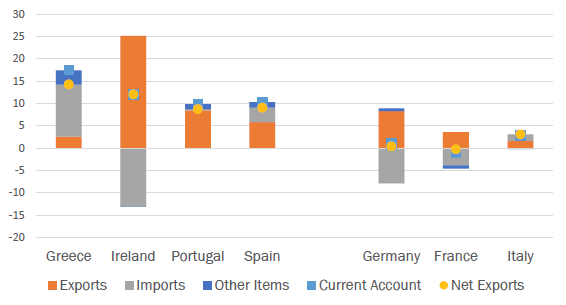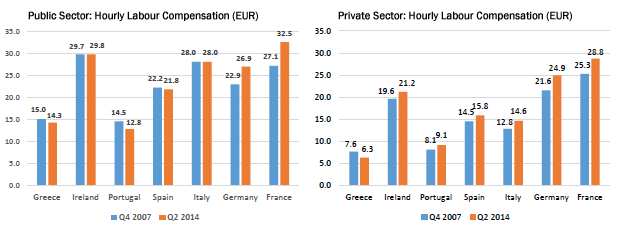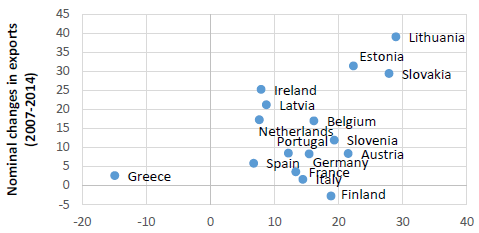The genie is out of the bottle: Europe is again discussing the possibility of Greece leaving the euro. With it, the debate has re-emerged regarding whether this would be helpful or not for Greece and whether there would be contagion to other euro area countries. The big questions are, of course, how the Greek financial system would survive an exit with a debt restructuring; how long it will take until Greece regains access to financial markets; and how big the benefit of a debt restructuring is given the relatively low interest load. The absence of external help would be a further factor weighing on Greece. All of these factors speak clearly against an exit from the point of view of Greece but I will not discuss them in detail here.
Instead, I want to focus on the claim that Greece needs to exit in order to devalue and in order to regain competitiveness so that it can grow again. This point has again been made prominently by Professor Hans-Werner Sinn of Ifo Institute in Munich.
So what do the data tell us? Greece, Ireland, Portugal and Spain all had very significant adjustments of their current accounts since 2007 from high deficits to close to balance or surplus. However, the composition of the adjustment has been very different (see chart below). In Ireland, Spain and Portugal, the largest part of the adjustment came from an increase in exports. All three countries have therefore managed to change their production structures and substantially increased exports. This is a desirable and healthy way of adjusting, which also shows that it was not primarily a demand compression that drove the external adjustment in these three countries. Also in Italy, the increase in exports was larger than the decrease in imports.
Greece stands out as an outlier in external adjustment. Its adjustment was almost exclusively driven by a contraction in imports while exports have only very recently been positive.

This raises the question, what is hampering export performance in Greece? Are high wages or the absence of a real depreciation the main drivers of the different adjustment experience of Greece compared to the other euro area countries? The following two graphs shows wages measured in euros in the public and in the private sector.

As we can see, hourly wages in the public sector have come down or remained constant in all of the stressed Euro area countries (Greece, Ireland, Portugal, Spain and Italy), while they increased in Germany and France. More interestingly, Greece stands out as the only country where hourly wages have come down substantially also in the private sector. This contrasts with the experience in the other three programme countries (Ireland, Portugal and Spain), where hourly wages in the private sector have, despite the adjustment efforts, increased.
Correlating the change in exports with the change in wages in the private sector shows that Greece is an outlier. Notwithstanding a dramatic drop in nominal wage growth over the period from 2007 to 2014, export performance remained weak, and did not pick up as we have seen in other countries. The following scatter plot illustrates further that Greece is a clear outlier, as are Lithuania and Slovakia.

Overall, I conclude that the Greek economy would not benefit as much as hoped for from a rapid depreciation. The reasons for the weak Greek export performance might primarily lie, among other factors, in rigid product markets, a political system preventing real change and guaranteeing the benefits of the few, as well as in a lack of meritocracy as nicely outlined by Brookings scholar Pelagidis. To the extent that the Troika can help reform the country, an exit of Greece from the euro would even be counterproductive.
This does not mean that the current debt trajectory and debt level is sustainable. It may be necessary to further alleviate the debt burden on Greece, especially if inflation remains low and growth is weaker than the Troika expects it to be. Such debt relief measures have been done a number of times before by the official creditors and, looking ahead, further measures to alleviate the Greek debt burden without incurring losses for Euro-area creditors are still feasible. In fact, the average maturity could be extended beyond the current 30 years. Also, the lending rate on the European loans could be reduced even further. All of this would not translate into more money for Greece to spend right now, but it would greatly improve the sustainability of the debt burden further.
An exit of Greece from the euro would cause extensive financial and economic disruption, with significant negative impacts on its domestic economy, prompting bank runs and capital flights from Greece. Capital controls would have to be enacted, which could not then be lifted easily, as shown in the case of Cyprus. A newly issued Greek currency would collapse in value, leading to high inflation and forcing at the same time banks and businesses with large foreign currency debts into bankruptcy. Furthermore, Greece would be cut out of the market for a certain time and borrowing costs for Greek businesses and society would skyrocket, contributing even further to another recessionary development.
Compared to 2012, the risk of financial contagion to other euro area countries is less acute, with the ECB now acting as lender of last resort, a healthier financial system and a new European governance structure set in place. However, a likely massive depreciation of a new Greek currency, followed by a potential default of Greek banks and non-banks would endanger private sector claims on Greece from all over the Euro area, on top of the official losses which would have to be accounted for. Also, the political long-term effects of an irreversibility of the Euro should not be underestimated. This would mean that the euro area has failed to establish the tools necessary to guarantee the survival of its weakest members.
To conclude, this article demonstrates that an exit is unlikely to easily help the economy much, as exports do not react considerably to changes in wage costs due to the sclerotic economy. Instead, it is certainly in the interest of both Greece and its euro-area partners to find a comprehensive agreement that would avoid default and exit.


